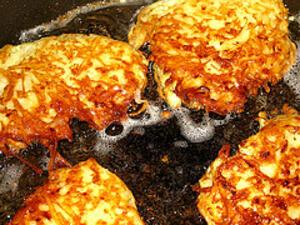Who wields the pans on Hanukkah?
Frying latkes.
Photo by The Gifted Photographer.
Ever since that one little jug found in the corner of the First Temple burned for eight days instead of one, olive oil has been political.
The one day supply of olive oil lasted for eight days, so the eternal flame did not go out while the temple was re-dedicated. Thus, Judaism’s victory against Hellenism was ratified by the holy light, and we now remember the miracle by serving fried food for eight days.
What does this have to do with women? I asked my rabbi, Ari Cartun, from Congregation Etz Chayim in Palo Alto, CA. He recalled two stories involving women that contributed to the victory that led to the recapture of the Temple. In Maccabees II, there was Hannah and her seven sons, who all chose to die rather than convert by eating of a forbidden animal, and made stirring speeches beforehand. Then, in the Apocrypha, which are writings about Jewish history contained in the Christian Bible, there is the book of Judith, a beautiful wealthy, widow, who rescued her town by beguiling and beheading the Assyrian commander Holofernes, and exhorting the Jews to rise up and attack.
“As far as I know, women created the traditional foods used to commemorate the holiday,” Rabbi Cartun said. This might explain why, in two branches of my extended family, Hanukah is the only time of the year that men cook. Rabbi Cartun takes up the spatula on Hanukah, to spare his wife the smell of burning oil, and the sting of the flying flecks of fat.
On the East Coast, my super competent cousin whom I will call Hannah (not Rifky the Balaboste from Long Island — I have lots and lots of cousins) and her husband hold a yearly Latke Fiesta. Hannah’s husband, who does not touch a pan all year, does all the frying. On the West Coast, my husband’s cousin, “Judith,” makes her husband do all the latke frying also -- in the garage. He uses a phalanx of electric frying pans on card tables to do the cooking in there, letting the cars sit outside. “All that frying smells up the house,” said “Judith.” “I don’t always send him to the garage. Some years, I let him cook in the backyard.”
Most women I know, however, do all the cooking on the holiday. Some even revel in it, like my friend Carol Saal. “I do the latke frying, in the kitchen, with lots of newly pressed oil (November is harvest and pressing time),” she said. “Growing our own olives and making olive oil means having the absolute luxury of cooking almost everything with olive oil - and lots of it!”
I get three or four pans going at once. Then it becomes a dance of the senses, a ballet of batter and oil. Last year, it became a Tom Sawyer meets Hanukkah deal, as my friends wanted to take a turn, and I sat and ate while they cooked.
So, who deals with the pans in your house? Is it a guy deal or a girl activity? Do you compete? Alternate? Banish the frying pans to the backyard?
Preeva Tramiel is a freelance writer in Palo Alto, California. She blogs at Melon Memories.








Thanks, Bruce. I appreciate it.
I used to be the one doing the frying but like most everything else. It's just too hard these days.
Just an FYI- does anyone have any idea how hard it is for disabled people to use CAPTCHA. Even with voice dictation its more than just the pain in the ass -. It actually keeps people like me from responding to pretty much anything, only for you Preeva
What a tempest in a frying pan! I'm no gourmet cook, but how hard is it to make good latkes? If you have a grater or food processor, it takes about 2 minutes to prepare the ingredients and another five minutes to fry. This isn't Cordon Bleu cuisine we're talking about here. Of all the traditional Jewish foods, latkes are among the easiest to prepare, topped only by matzah balls (and why anyone would bother to buy a mix for those, I cannot fathom).
So if the question is whether latkes are easy enough for a man to prepare, I'd say that even the most befuddled husband should be able to turn out a decent batch. Whether he'll clean up the splatters is a different story.
As I read your blog this very moment, Mr. S is peeling and grating the potatoes. And he uses his cast iron pans, which I don't even think I can lift. On the few occasion I have made latkes its from the streits mix or Trader Joe's frozen. BTW - Mr S. will sprinkle sugar on his as soon as he drains the oil. Also - with the advent of the politically correct reusable grocery bag, we've been scurrying around trying to find enough brown paper bags to drain the oil. Never used to be a problem.
In my family, both of my parents make the latkes together. My mother peels the potatoes and my father makes the actual latkes. This seems so normal to me that I find it really weird when my roommate talks about perfecting her latke-making skills before she gets married. Why does she think it has to be her job?
Who wields the pans may be less a gender issue, and more an issue of who can bear to stand at the stove and watch all that oil being soaked up into the food you're about to eat!